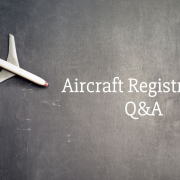Aircraft Registration in Austria: Q&A
The Austrian Aircraft Registry has enjoyed popularity with both aircraft operators and aircraft owners for quite some time now. In total, more than 1,800 aircraft and helicopters are already registered in Austria. Judging by the number of inquiries on aircraft registration in Austria we are currently receiving at Weisenheimer Legal, the number of registrations is very likely to increase in the coming months.
In order to assist with your considerations and evaluations, we have briefly summarized the most frequently asked questions regarding aircraft registration in Austria in this Q&A:
- Who is responsible for the registration of an aircraft in Austria? The aircraft owner or the aircraft operator*?
In principle, only the operator (as holder of the aircraft) can procure the registration. This requires – where the operator is not also the legal owner – the consent of the owner. The consent is given by transferring the holdership of the aircraft to the operator. In practice, a form provided by Austro Control must be used for this purpose.
- What are the nationality requirements for the operator and the owner?
In short (simplified): The operator must be established under the laws of a member state of the EU and have its registered office in a member state of the EU. If the operator does not have an address for service of process in Austria, they must appoint an Austrian agent for this purpose. We at Weisenheimer Legal have long experience acting as process agent for our international clients and can therefore offer you competent and reliable handling of your registration process in Austria.
The aircraft owner need not meet any particular nationality requirements, provided that they transfer the holdership of the aircraft to an operator (holder) who meets the previously described requirements.
- In what form must the documents be presented for registration?
Normally, copies of documents that can be sent to Austro Control by e-mail are sufficient. In some cases, certified translations of original documents are required. Documents in English are mostly accepted.
- Can pledges on aircraft be registered in Austria?
No, this is not possible. This being said, we will be happy to advise you on the best practice of creating pledges on aircraft.
- Do contracts between the operator and the owner need to be disclosed?
No. The agreement between the operator and the owner need not be disclosed; it is sufficient to submit a signed form confirming the transfer of holdership, as provided by Austro Control.
It is not necessary to enter into a lease agreement or a holdership agreement. However, in some cases it is recommended to conclude a holdership agreement in order to facilitate the process.
- Can the owner deregister the aircraft without the operator’s consent?
No. Only the operator can deregister the aircraft. Therefore, it is also recommended that the operator (acting as holder) issues a Power of Attorney for Deregistration in favor of the owner.
- What proof does the owner have that he is known to Austro Control as the owner of the aircraft?
Only the operator is named on the Certificate of Registration. Unfortunately, the official translation of the “operator” (holder) on the Certificate of Registration as “Name of Owner” is somewhat misleading. At the request of the operator, Austro Control issues a confirmation to the owner stating that the owner of the aircraft is known to it as the legal owner and that the owner named on the Certificate of Registration is not to be regarded as the legal owner.
Click here for the pdf version of our Q&A on Aircraft Registration in Austria.
*In connection with aircraft registrations, the term “holder” and not “operator” is used in Austria. In this Q&A, the term “operator” is used for ease of reading, but it is to be understood in the sense of “aircraft holder” and not in the sense of Regulation (EU) 965/2012. In order to be able to act as “holder” of an aircraft, neither an operating license nor an AOC is required.


